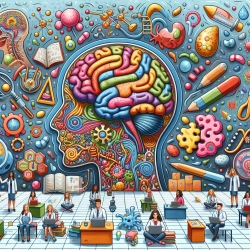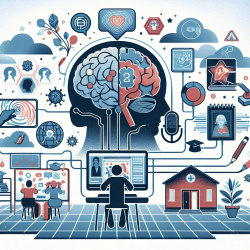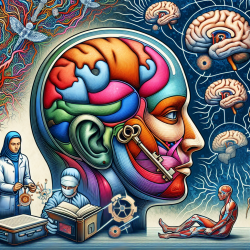Introduction
In the ever-evolving field of special education and therapy, staying informed about the latest research is crucial for practitioners. One such research that has garnered attention is the study on "Brain dysfunction and thyroid antibodies: autoimmune diagnosis and misdiagnosis." This study, conducted by Valencia-Sanchez et al., provides valuable insights into the complexities of diagnosing autoimmune encephalopathy, particularly in the context of thyroid antibodies.
Understanding the Study
The research aimed to review cases of suspected Hashimoto encephalopathy and evaluate the clinical utility of thyroid antibodies in diagnosing autoimmune central nervous system (CNS) disorders. The study found that a significant number of patients referred with suspected Hashimoto encephalopathy had alternative non-autoimmune diagnoses. This finding highlights the potential for misdiagnosis when relying solely on thyroid antibody presence without considering other objective neurological and immunological markers.
Key Takeaways for Practitioners
For practitioners, this research underscores the importance of a comprehensive evaluation when diagnosing autoimmune encephalopathy. Here are some key takeaways to improve diagnostic accuracy:
- Comprehensive Evaluation: Practitioners should incorporate a thorough clinical history and examination, along with objective testing such as cognitive assessments, imaging, EEG, and CSF analysis.
- Objective Measures: Relying on objective neurological dysfunction and CNS inflammation markers is crucial. This includes looking for specific neural antibodies and inflammatory markers in CSF.
- Consider Alternative Diagnoses: It's essential to rule out alternative diagnoses, especially when thyroid antibodies are present without corresponding neurological abnormalities.
Encouraging Further Research
While this study provides valuable insights, it also opens avenues for further research. Practitioners are encouraged to delve deeper into understanding the relationship between thyroid antibodies and brain dysfunction. This could involve exploring the role of other autoimmune markers or investigating the long-term outcomes of patients with autoimmune encephalopathy.
Conclusion
In conclusion, the study on brain dysfunction and thyroid antibodies serves as a reminder of the complexities involved in diagnosing autoimmune encephalopathy. By incorporating comprehensive evaluations and considering alternative diagnoses, practitioners can improve their diagnostic accuracy and provide better care for their patients. For those interested in further exploring this topic, the original research paper offers a detailed analysis and can be accessed here.










